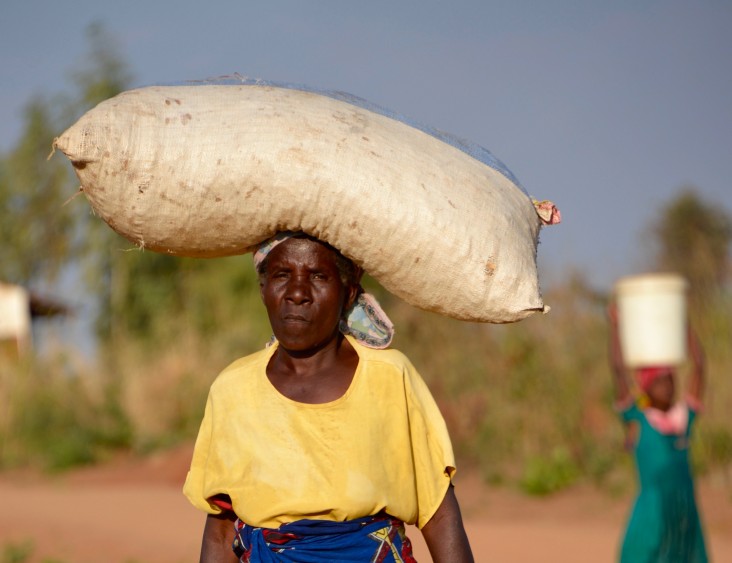
PROGRAM OVERVIEW
“I thank the experts at USAID’s Integrating Nutrition into Value Chains, whose mentorship and support has contributed to the growth of this business” – Chrissie Rice, Malawian business owner of Estrell Trading Company, one of Malawi’s most successful groundnut processing businesses.
Smallholder farmers, who cultivate 90 percent of the arable land in Malawi, face many challenges including declining soil fertility, erratic rainfall, land constraints, and poor institutional support. With limited access to credit, inputs, and price information, the typical farmer struggles to support his family on only 2.5 acres of land. This causes issues in childhood malnutrition that then result in 37.1 percent of children under 5 having stunted growth. Therefore, agriculture, nutrition, and climate-resilient growth are top development priorities for USAID. Through partnerships with the Government of Malawi, and local and international non-governmental organizations, USAID is spearheading innovative programs to strengthen smallholder farmers’ economic and climatic resiliency.
PROGRAM ELEMENTS
AGRICULTURE
USAID/Malawi’s Feed the Future activities strengthen the competitiveness of the soy, groundnut, and orange-fleshed sweet potato value chains, improve the nutritional status of women and children, and build the capacity of Malawian agriculture and nutrition organizations. These agricultural activities promote the use of improved farming practices and technologies, including seed varieties which are drought tolerant, disease resistant, and early maturing; and climate smart agriculture that helps improve soil fertility, yields, and ultimately helps to increase household incomes, making farmers more resilient to external shocks.
NUTRITION
The Feed the Future and Food for Peace activities support community-level nutrition interventions to improve community capacity to prevent and reduce under-nutrition. The activities include the promotion of optimal breastfeeding, complementary feeding, growth monitoring, food preparation and utilization, as well as hygiene and sanitation implemented through the care group model. These activities are directed to households with pregnant and lactating women and children under age five, with an emphasis on children under two.
CLIMATE RESILIENCE
Malawi is highly vulnerable to climate variability. Together with the Government of Malawi, USAID works to develop strategies and interventions for combatting deforestation and improving forest governance. USAID’s environment activities and the Food for Peace Development Programs strengthen the resilience of vulnerable populations by addressing the main drivers of deforestation, enhancing land and water management, and increasing the capacity of local communities to manage their natural resource base.
HUMANITARIAN RESPONSE
USAID provides support to the Government of Malawi in response to humanitarian needs that occur due to the food insecurity situation as a result of adverse weather conditions. USAID channels its resources through the World Food Program (WFP) for the procurement of emergency relief commodities including maize, beans, corn-soya blend, and sorghum, and related logistics support. In 2015, USAID started to address underlying causes of food security in six southern Malawi districts through the UBALE and NJIRA development programs.
IMPACT
In FY 2015, USAID:
- Assisted 94,524 farmers to improve soy production by increasing access to quality certified seed and promoting improved technologies such as use of inoculant, intensification of double row planting and improved post-production handling. USAID reached 33 percent of total soya producers in the FTF targeted districts.
- Increased land under soy related improved technologies from 2,384 hectares in 2013 to 24,179 hectares.
- Aided 82,425 smallholder groundnut farmers, representing 17 percent of total groundnut producers in the Zone of Influence, to plant more disease-resistant and improved varieties of seeds on 22,290 hectares.
- Improved the nutrition of 147,201 children reached through community-based Care Group activities that provide women with nutrition education and cooking demonstrations using nourishing foods like soybean and groundnut.
- Helped more than 1,200 stakeholders to adapt to the effects of climate change through training and capacity building activities, and more than 500 project participants to implement risk-reducing practices.
- Promoted ecosystem-based approaches to climate change adaptation that resulted in more than 37,000 hectares of biological significance being placed under improved management.
- Supported efforts to reduce deforestation at a national scale by generating livelihood benefits for thousands of forest-dependent communities at the local level.
- Continued its strong focus on public-private partnerships. The Kulera REDD+ Project initiated through USAID support attracted more than $500,000 in private financing for local conservation and development priorities.







Comment
Make a general inquiry or suggest an improvement.